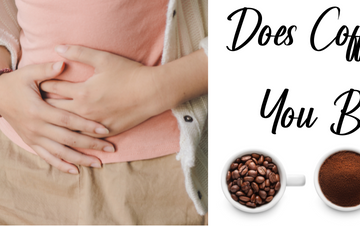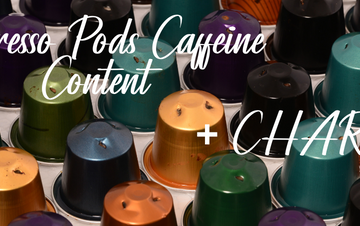Coffee Grounds in Garbage Disposal or Down the Sink: Yes or No
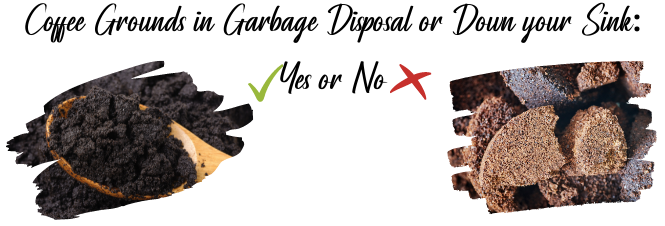
Anyone who makes coffee produces coffee grounds. The issue is how to dispose of coffee and coffee grounds efficiently. If you aren’t a hobby farmer who can compost old coffee grounds, you’ll have to find out how to get rid of them on your own.
Many people believe that coffee grounds in garbage disposal might clog the sink drain or the removal. So, can you put them there or not? Yes, I’d say so, but you have to be careful, and there are some alternatives not to block the waste disposal system.
Coffee grounds are much too valuable to be thrown away. We can use them to clean up waste disposal as well.
So, I decided to show you different ways of using your old coffee grounds. That way, you will save your kitchen and garbage disposal.
Let`s dig in 🙂
TABLE OF CONTENTS:
- Coffee Grounds Down the Drain: YES Or NO?
- Why You Shouldn’t Put Coffee Grounds Down the Sink?
- DIY Coffee Ground Drain Cleaner
- Can You Put Coffee Grounds in The Garbage Disposal?
- How to Dispose of Coffee Grounds?
- Disposing Of Coffee Grounds From French Press
- How You Can Use Old Coffee Grounds?
Coffee Grounds Down the Drain: YES Or NO?
Flushing coffee grounds down the drain is not a good idea. They’re right up there, with oil, grease, and fat as one of the most common causes of clogged drains. It won’t cause damage if it’s only a few grounds from the bottom of the pot. But frequently dumping coffee grounds down the drain will cause them to stack up and clump together. They’ll clog your gutter when they cluster together.
Coffee grounds effectively remove odors, which is why some people believe putting them down at the garbage disposal is a good idea. Unfortunately, they won’t dissolve in water. Instead, they’ll stick together and clog your pipes because they’re so clumpy.
If your pipes become blocked, you’ll either need to hire a plumber or try to fix it yourself. Stop pouring your coffee grinds down the drain if you don’t like either choice.
If you want to dig further, you may utilize them in various ways.
Why You Shouldn’t Put Coffee Grounds Down the Sink?
Coffee grounds can attract grease in addition to their inherent inclination to clump together when wet. As a result, when you wash your pots and pans after supper, the oils and grease pile up. They adhere to the coffee grounds, clogging the drain.
If you believe tossing your coffee grounds in the trash is wasteful, you may put them to good use in different ways. Compost piles are ideal for storing them since they return nutrients to the soil, resulting in a more acidic composition. That makes it simpler for your plants to absorb the nutrients they require.
When combined with orange peels, coffee grinds in your garden might discourage wandering animals or your neighbor’s curious dogs. It’s an environmentally responsible and animal-friendly way to keep unwelcome visitors at bay.
Ants are supposed to dislike coffee grounds as well. Assume you don’t want to use pesticides or sprays on your home’s interior or exterior. In that case, coffee grinds might be a natural alternative.
DIY Coffee Ground Drain Cleaner
Several commercial kitchen drain cleaners on the market will swiftly clear a clogged drain with coffee grounds. Many people find these cleaners excessively harsh and possibly harmful, especially in the kitchen. Fortunately, there are other food-safe techniques to clear your kitchen drain.
It’s preferable to start by manually removing the drain clog. You may release any pressure with a plunger, then drive the clog through with a plumber’s snake or even a wire coat hanger.
After you’ve cleared the obstruction, you’ll probably want to remove your drain of any remaining debris. Using vinegar and baking soda to trigger a reaction within your drainpipe is the easiest method to achieve this in a food-safe manner. First, pour a cup of sodium bicarbonate down the drain. After that, add half a cup of white vinegar. Because the combination will start foaming right away, put the stopper in the gutter to force the liquid down the pipe.
Allow the baking soda and vinegar combination to work for approximately an hour before flushing the drain with hot water. Take a look at your kitchen sink to see if it’s clean. If it’s still taking a long time to drain, repeat the procedure.
Can You Put Coffee Grounds in The Garbage Disposal?
Since coffee grounds are already into small pieces, it’s an enticing idea. You did it yourself when you crushed up the entire coffee beans to create the coffee. Or when they ground up coffee beans for sale, the manufacturer did it for you. However, the answer is yes, it is OK to dispose of coffee grounds.
But, this approach comes with one caveat: don’t put too many in at once. Just as with other foods, moderation or less is the most acceptable method to dump your grinds into the disposal.
The sole reason you should put coffee grounds in your garbage disposal is to mask the stink of garbage that accumulates in your sink after multiple usages.
How to Dispose of Coffee Grounds?
It appears that dumping leftover food down the drain is a straightforward remedy. It’s especially true if you don’t have access to a good rubbish collection service or a garden. However, placing the coffee grounds in a garbage bag is nearly as time-consuming as pouring them down the drain. By putting the grinds in the garbage, you may also conserve water.
There is, however, a better way to get rid of your coffee grounds. Add them to your compost pile or at the base of your plants. Nitrogen, potassium, and phosphorus are among the nutrients found on these grounds. Your plants require those three minerals to grow large and healthy.
Remember that there are far superior alternatives to utilizing your garbage disposal.
Disposing Of Coffee Grounds From French Press
The filtration of coffee grounds in a French press isolates the bulk of the essential oils. That reduces the flavor’s intensity. Factors such as water temperature and preparation time come into play. After you’ve made coffee in your French press, it’s time to clean off the grounds. See the following steps to make it easier:
- Check that all coffee grounds are at the bottom of the carafe. To do this, push down the plunger on the top of the press.
- Pour away any leftover coffee. You can also refrigerate it by pouring it into a container.
- Remove the mesh filter by pulling up on the plunger. It shouldn’t have a lot of coffee grounds on it, and it’s easy to clean with warm water and soap.
- Grip the carafe’s top and carefully pull it away from the metal base.
- Scrape the coffee grounds from the glass carafe with a wooden spoon. If you use a metal one, the carafe may fracture. A plastic utensil may flex or shatter because of the firmly packed coffee grounds at the bottom of the carafe.
- Put the coffee grounds in the trash or, if you have one, throw them into your compost pile.
- To clean the carafe, use warm, soapy water. This mixture cuts through the coffee grinds’ remaining oils. Cleaning the carafe should be done with a few coffee grounds as feasible.
How You Can Use Old Coffee Grounds?
Many of us are becoming more ecologically concerned and consciously lowering our trash output. You can make a minor impact by reusing your old coffee grounds. Most people toss them away, which means they are in landfills, generating the dangerous gas methane. Methane has a 25-fold more significant impact than carbon dioxide as a greenhouse gas. Because it is one of the critical sources of global warming, we mustn’t discard our coffee grounds.
There are several methods to repurpose them around the house, in the garden, and at work.
Coffee Grounds can be used as Fertilizer
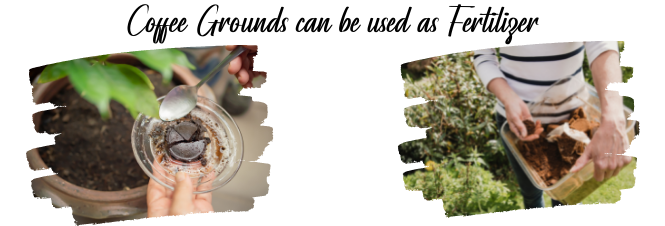
Coffee grounds are an excellent nutrient-rich fertilizer, and their texture aids in soil drainage, water retention, and aeration. However, it would help to compost them first before using them on your plants. Degradation of the coffee grounds is necessary before the plants can obtain the nutrients they need from the coffee. It can also create a tiny amount of heat during the breakdown, harming plant roots. So, to keep your plants healthy, always compost them first.
Coffee Grounds can absorb odors
Coffee grounds absorb odors, making them helpful in keeping tiny places smelling fresh. Refrigerators and freezers are frequent applications. Fill a jar with coffee grinds and place it in the refrigerator for a couple of weeks to absorb any odors. After you’ve finished using it, you may still use it as fertilizer.
Coffee Grounds can be used for Skincare

Coffee grinds may be the solution for smoother skin. When applied directly to the skin, coffee is high in antioxidants and has a significant exfoliating effect. Combine your grinds with some coconut oil to make this DIY sustainable scrub. Massage it into your skin in circular strokes while showering, then rinse. You may experiment with different scrub formulas to see which one works best for you.
Coffee Grounds can be used to grow mushrooms
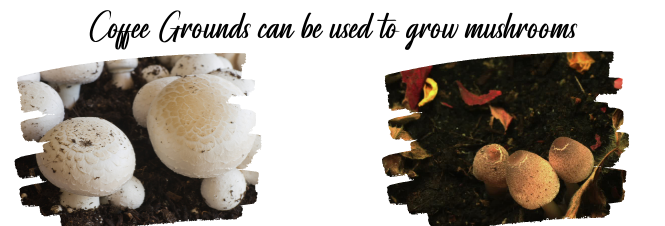
Mushrooms contain significant amounts of the B vitamins riboflavin and niacin. They also contain pantothenic acid and have a specific taste. The combo may aid in safeguarding heart health, so it’s a win-win situation. You can grow mushrooms in your home using coffee grounds!
Different applications of Spent Coffee Grounds
When I started researching the topic, I came across exciting applications of coffee grounds. In the previous section, I looked at how you can apply it in your household.
Here I will look at its application in various industries, including developing a coffee-based biorefinery. I hope you will find it interesting.
- Coffee grounds can enrich the brown rice with Fe and Zn when used in the soil.
- Using spent coffee grounds in novel mortars for different applications in the building sector can improve technical and sustainable performances.
- Spent coffee grounds are used in biorefineries that process waste. During processing, they can be converted into various biofuels. This includes biogas, biodiesel, and fermentable sugars.
- A chemical component from recycled spent coffee grounds is used as an electrolyte additive in aluminum-air batteries.
- Spent Coffee grounds can be a part of a circular-based economy in the food waste sector.
Final Words
Even in their discarded form, coffee grounds are far too valuable to be dumped down the drain or in the garbage disposal. They are beneficial to fertilizers and compost. Otherwise, putting coffee grounds down the garbage disposal can be hazardous to your plumbing system. Generally, I would not advise you to do so.
There are various ways to dispose of and use discarded coffee grounds. However, throwing it in the garbage disposal is not one of them. It has the potential to clog your pipes. Even so, because it can get rid of odors and clean the garbage disposal, you can use it to make your kitchen smell better.
Many people use hot water to force possibly clogging coffee grinds down, but plumbing experts advise against it. Baking soda and salt to the coffee grounds are preferable when cleaning the garbage disposal.
References
- Composting At Home | US EPA. (2013, April 17). US EPA. https://www.epa.gov/recycle/composting-home.
- Nuhu A. A. (2014). Bioactive micronutrients in coffee: recent analytical approaches for characterization and quantification. ISRN nutrition, 2014, 384230. https://doi.org/10.1155/2014/384230
- Fischer TW, Hipler UC, Elsner P. Effect of caffeine and testosterone on the proliferation of human hair follicles in vitro. Int J Dermatol. 2007 Jan;46(1):27-35. https://doi.org/10.1111/j.1365-4632.2007.03119.x. PMID: 17214716.
- Nathanson JA. Caffeine and related methylxanthines: possible naturally occurring pesticides. Science. 1984 Oct 12;226(4671):184-7. https://doi.org/10.1126/science.6207592. PMID: 6207592.
- Adi AJ, Noor ZM. Waste recycling: utilization of coffee grounds and kitchen waste in vermicomposting. Bioresour Technol. 2009 Jan;100(2):1027-30. https://doi.org/10.1016/j.biortech.2008.07.024. Epub 2008 Aug 26. PMID: 18752936.


